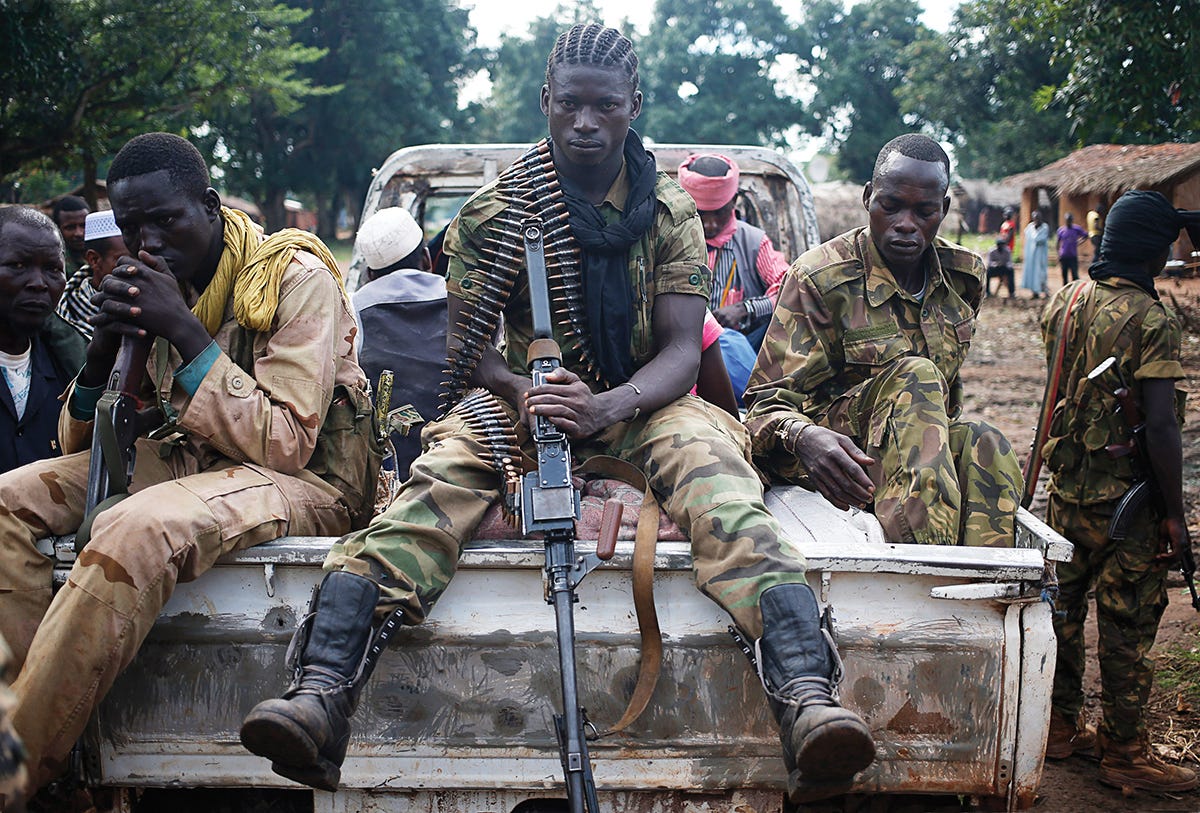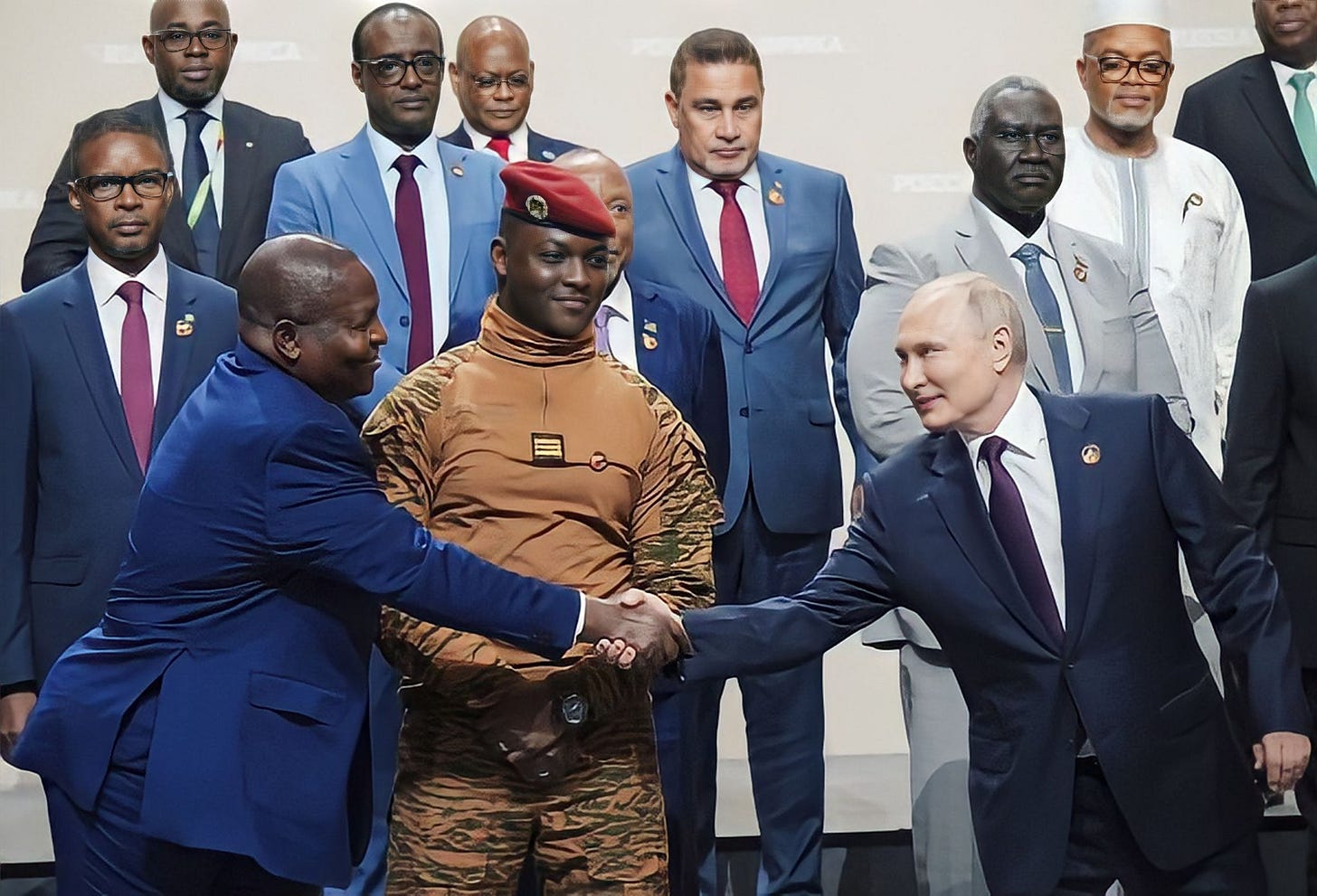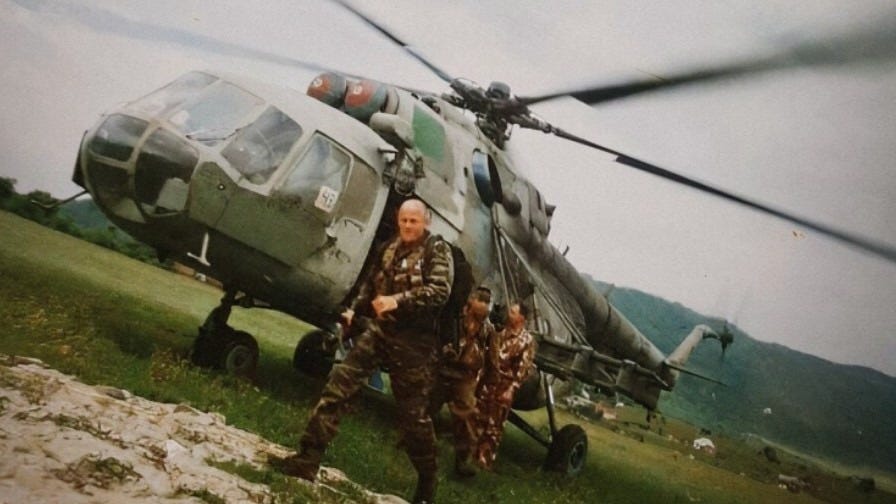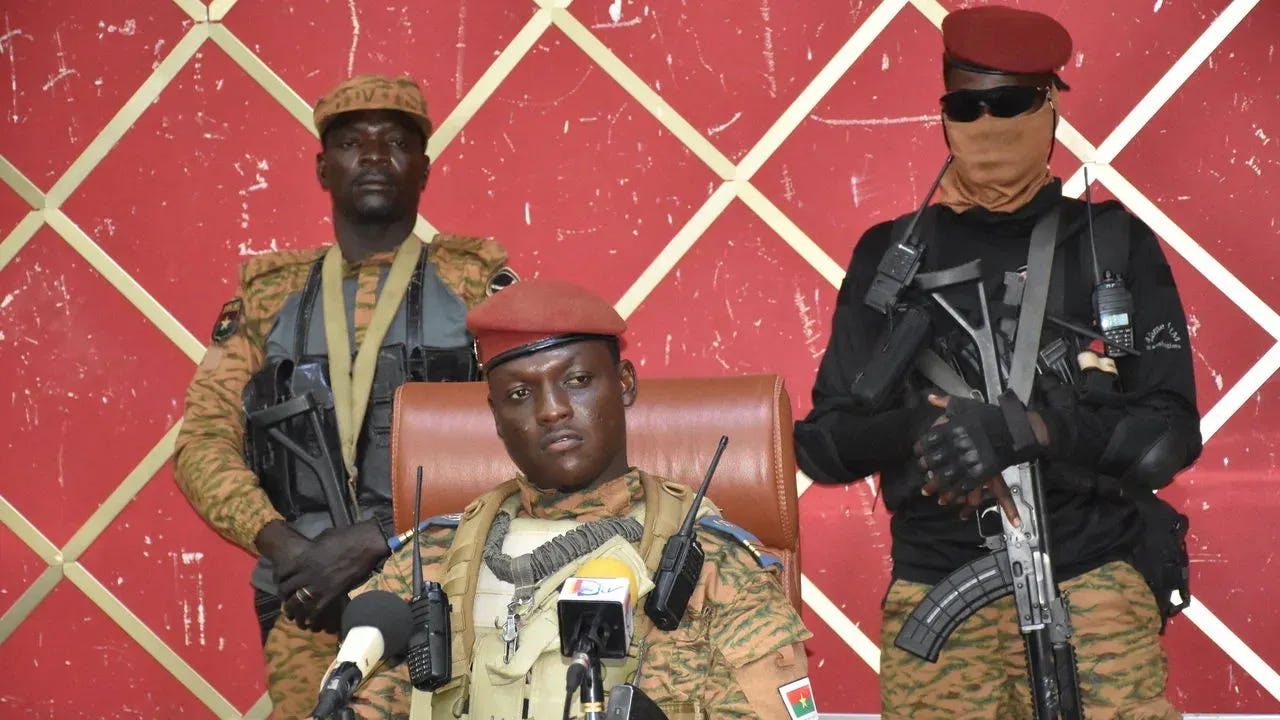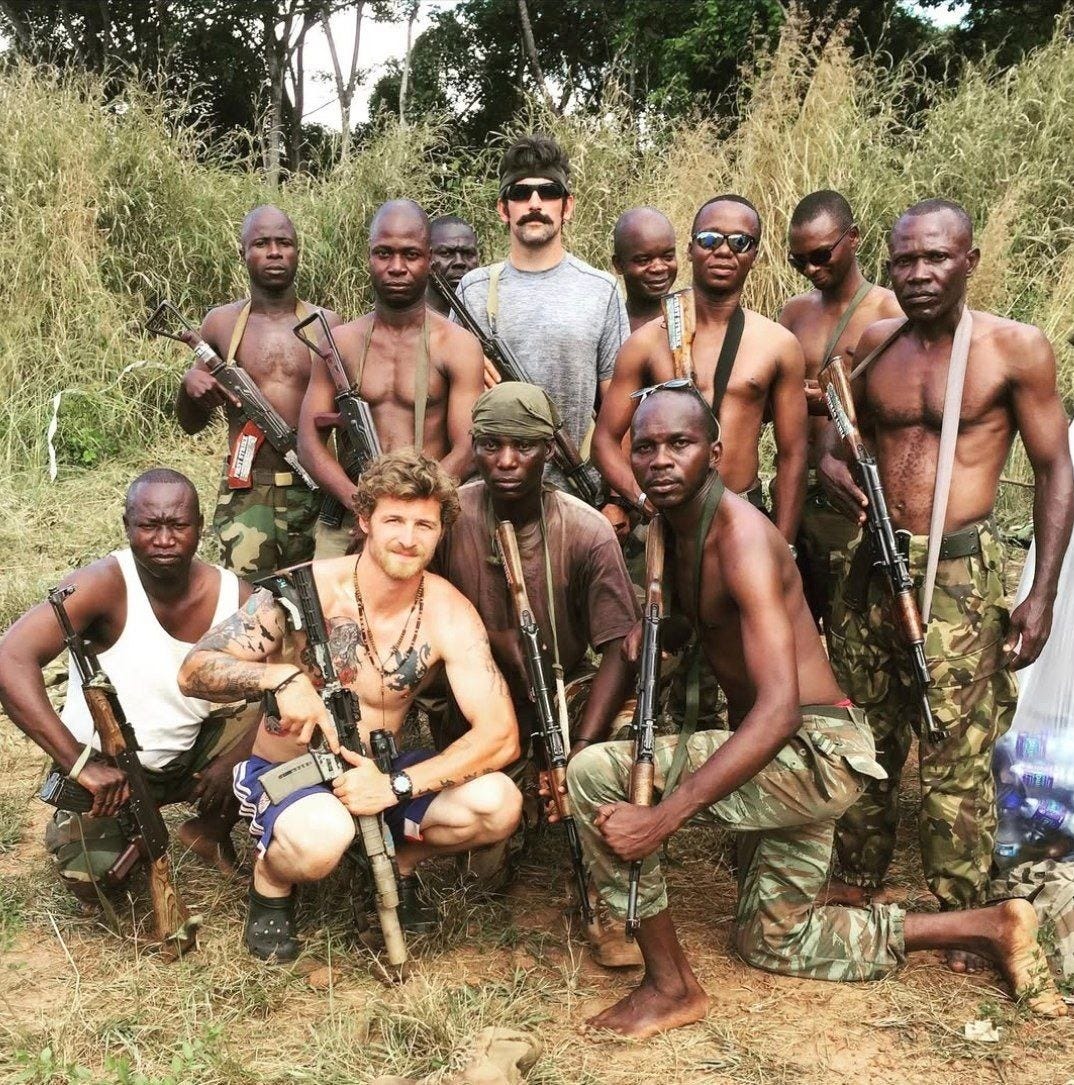Paramilitary Forces in Africa
Private Security and Foreign Intelligence in Africa’s Resource Wars
Bottom Line up Front (BLUF)
This assessment examines the growing presence and impact of Private Military Companies (PMCs) across Africa, with particular focus on their role in modern geopolitical competition, resource extraction operations, state backing mechanisms, and associated security threats. PMCs have evolved from traditional mercenary groups into sophisticated corporate entities operating in legal gray zones while maintaining close ties to state sponsors. Their primary operational focus centers on securing natural resources and strategic interests, particularly in the 19 African nations where Russian PMCs currently operate, predominantly in regions with governance deficits and valuable resource deposits. Africa (uranium in Niger, gold in Sudan, and rare earth minerals in the Democratic Republic of Congo) has emerged as a strategic arena for global powers seeking to expand their influence through the deployment of PMCs to project power across the continent.
Deniable Operations: PMCs serve as deniable extensions of state power, enabling sponsor countries to pursue strategic objectives while maintaining plausible deniability in gray-zone operations.
Resource-Focused Activities: PMCs are predominantly deployed to secure and extract high-value resources including oil, minerals, diamonds, and rare earth elements.
State Backing: Despite claims of independence, PMCs maintain deep connections to state intelligence services, military institutions, and political leadership of their sponsor nations.
Security Threat: PMCs pose significant risks to regional stability, sovereignty, and governance while presenting reliability concerns even to their sponsor states.
1. HISTORICAL CONTEXT
PMCs have evolved from traditional mercenary forces into corporate entities offering military, paramilitary, and security services. Archival records of Cecil Rhodes’ British South Africa Company (1890s) reveal precedents for modern PMCs like Wagner, which similarly blend resource extraction with political control. Declassified UK Foreign Office memos from the 2002 Green Paper illustrate how PMCs like Sandline International and Executive Outcomes were used to retain control over mineral-rich regions in former colonies. Likewise, French PMCs like Secopex and Agemira operate in former colonies (e.g., DRC, CAR), mirroring colonial-era “security” firms that protected rubber and mineral interests. Illustrative historical precedents include:
Executive Outcomes (1990s): South African PMC that pioneered the modern business model of high-impact, short-term, high-cost stabilization missions. In Angola (1993-1996), EO deployed a force of approximately 3,000 soldiers with air support including Mi-24 Hind and Mi-8 helicopters to protect Chevron oil infrastructure and decimate UNITA rebel capacity. In Sierra Leone (1995-1997), they reclaimed strategic diamond fields from Revolutionary United Front (RUF) rebels using ex-South African Defence Force SIGINT and HUMINT capabilities, significantly weakening rebel forces and leading to temporary peace accords.
Sandline International (1990s-early 2000s): Founded by British ex-intelligence and special forces officers, operated in Sierra Leone alongside EO and in Papua New Guinea where their contract led to regime collapse. Co-founder Simon Mann's 2004 "Wonga Coup" attempt in Equatorial Guinea involved a detailed plan to install opposition leader Severo Moto in exchange for lucrative oil concessions, resulting in Mann's arrest and imprisonment until his pardon in 2009.
Keenie Meenie Services (founded 1975): UK-based PMC established by former SAS officers David Walker and Jim Johnson. In Sri Lanka, KMS provided tactical training and helicopter gunship pilots to government forces during the civil war, specifically supporting operations against Tamil separatists in the Jaffna Peninsula between 1984-1986.
Teleservice (founded 1993): Established by high-ranking Angolan military generals, provided security for Sonangol (state oil company), Chevron-Texaco, Esso, Halliburton, and TotalEnergies. Their operations included maritime patrols of offshore oil installations and protection of diamond-producing regions in Lunda Norte province, with documented incidents of torture and extrajudicial killings against suspected diamond smugglers.
Alfa 5 (founded 1993): Majority-owned by ENDIAMA (state diamond company), secured strategic mineral zones including the Catoca diamond mine and border areas against theft and insurgent attacks. In 2021, ENDIAMA attempted to privatize Alfa 5 but failed to find buyers willing to maintain its operations while addressing human rights concerns.
2. Grayzone Conflicts
PMCs serve as tools for conducting deniable operations that allow states to pursue strategic objectives while maintaining plausible deniability:
Wagner & the Russian Expeditionary Corp (REK)
Wagner Group: Closely tied to Russian GRU (military intelligence), deployed across 19 African countries including CAR, Sudan, Mali, and Libya. The group operates with over 50,000 personnel and utilizes Russian military equipment including BMP-3 infantry fighting vehicles, T-72 tanks, and Mi-8/Mi-24 helicopters. Designated a terrorist organization by France (January 2023), Estonia (January 2023), Ukraine (July 2023), Lithuania (March 2023), and the UK (September 2023). Wagner's operations have included:
CAR (2018-present): Approximately 1,200 personnel deployed providing security for President Touadéra and mining operations
Sudan (2017-present): 500+ contractors working with Rapid Support Forces (RSF). We’ve also seen the employment of contractors for cyber espionage and information warfare, including hacking opposition groups in Sudan. Satellite images of gold mines in Sudan’s Wadi Halfa region, controlled by Wagner-linked entities like M Invest, show large-scale excavation and transport infrastructure.
Mali (2021-present): 800-1,000 personnel replacing French counter-terrorism forces. In CAR and Mali, Wagner controls local media outlets and runs disinformation campaigns promoting anti-Western narratives, while training political elites and security forces.
Libya (2019-present): 1,200 fighters supporting Khalifa Haftar's Libyan National Army
Post-Prigozhin Reorganization (2023): Following Yevgeny Prigozhin’s death in 2023, the Wagner Group’s operations in Africa underwent significant restructuring. In the Central African Republic (CAR), Wagner’s activities continue under the leadership of Dimitri Sytyi and Vitaly Perfilev, who have maintained close ties with the Russian Ministry of Defense. Sytyi, in particular, has been instrumental in advancing Russia’s agenda in Bangui, including overseeing military training initiatives and managing economic ventures such as the production of popular local beverages . Concurrently, the Russian government established the Africa Corps, a state-controlled entity under the Ministry of Defense, which has absorbed many of Wagner’s former operations. The Africa Corps focuses on providing military support, training, and counterterrorism assistance to Russia-aligned governments in countries like Libya, Mali, Burkina Faso, Niger, and the CAR . This transition signifies a shift from a semi-autonomous PMC model to a more centralized and state-directed approach to Russia’s military engagements in Africa. Following Wagner's June 24, 2023 rebellion against Putin, the organization fractured into multiple entities:
Redut: 2,000+ contractors focused on Syria and Libya operations, directly reporting to Russian GRU
Africa Corps: Founded October 2023 under direct GRU oversight, absorbed Wagner's infrastructure in Mali, CAR, and Burkina Faso
Convoy: 800 personnel operating in Central Asia, particularly Kazakhstan and Kyrgyzstan
Bear Brigade: Formed March 2023 in Crimea with 1,500 fighters, now training special forces in Burkina Faso
Patriot PMC: Emerged January 2024, recruiting 3,000+ Wagner veterans specifically for Arctic resource protection
RSB Group (Marsalek): Acquired in 2017 by Jan Marsalek through Stanislav Petlinsky, restructured into a Russian entity (OOO RSB Group) and an Isle of Man offshore firm (RSB Group Ltd.). In Libya (2017-2019), RSB deployed 75-100 operatives to protect Libyan Cement Company facilities while supporting General Khalifa Haftar's forces under the guise of "mine-clearing." In Sudan (2018-2020), RSB worked alongside Wagner, providing 50+ security specialists for Russian mining interests, with operations financed through Wirecard's payment infrastructure.
U.S. Operations
Blackwater/Academi: Operated extensively in Iraq (2003-2009) with 987 armed contractors and Afghanistan (2001-2021) with over 1,200 personnel. Notable incidents include the Nisour Square massacre (September 16, 2007) where Blackwater contractors killed 17 Iraqi civilians. In 2006, 12 Blackwater "tactical action operatives" were specifically recruited for a secret raid into Pakistan targeting an al Qaeda training camp in North Waziristan, operating under CIA direction.
Triple Canopy/Constellis: Formed through 2014 merger of Triple Canopy, Academi, and others. Currently maintains approximately 250 contractors in Nigeria protecting oil infrastructure, 175 in Ghana securing diplomatic facilities, and 200+ in Kenya protecting U.S. interests. Their 2021-2023 State Department contract for diplomatic security in high-risk locations was valued at $1.3 billion, demonstrating their formal government connection while maintaining operational flexibility.
Mozart Group (USA): Founded July 2022 by retired US Marine colonel Andrew Milburn. Based in Wyoming but operating in Ukraine with 20-30 former U.S. and NATO special forces personnel. They've trained approximately 3,000 Ukrainian troops in combat medicine and small unit tactics, primarily in Donbas region, while maintaining they perform no direct combat functions.
Chinese Operations
Frontier Services Group (FSG): Founded by Erik Prince in 2014 and backed by CITIC (Chinese state-owned enterprise) with a 25% ownership stake. Protects Belt and Road projects in Pakistan, Myanmar, and East Africa. Acts as a hybrid between corporate security and political risk mitigation. FSG maintains specific operations:
South Sudan: 350+ personnel protecting Chinese National Petroleum Corporation facilities since 2016
DRC (2018-present): Its subsidiary received explicit mandate to extract minerals and timber from North Kivu province
Kenya: Established training base for 4,000+ Chinese-contracted security personnel
Ethiopia: Provides security for Chinese infrastructure projects including Addis Ababa-Djibouti railway
China Overseas Security Group
Secures mining/logistics in Central Asia and Africa (DRC, Zambia).
Legal Circumvention: Chinese PMCs like Ding Tai An Yuan cooperate with armed Iraqi security to protect oilfields in southern Iraq, particularly in Basra province's new hydrocarbon extraction areas. Since 2019, they've deployed approximately 150 contractors to secure PetroChina's operations in Iraq's Halfaya and Rumaila oilfields, allowing China to maintain presence while technically adhering to non-interference policy.

Other Notable Operations
Sadat International Defense Consultancy: Founded 2012 by former Turkish brigadier general Adnan Tanrıverdi. In 2023, Sadat deployed an estimated 400-500 Syrian mercenaries to Niger following the July coup, specifically to protect Turkish mining interests. In Mali, approximately 300 Sadat-linked personnel operate alongside Wagner remnants, focusing on areas bordering Burkina Faso and Niger where Turkey has commercial interests. Supports Turkish-aligned militias in Libya and Syria. Deployed to protect strategic interests in Somalia (ports and logistics hub) and Qatar.
Reflex Responses (R2) – Erik Prince’s UAE-based PMC Trained mercenary units from Colombia, South Africa, etc. Secured ports and oil interests across the Gulf of Aden and Horn of Africa (Somalia, Yemen). Involvement in Libya.– PMCs used for air support, snipers to support Haftar’s oil-terminal control.
United Kingdom - Control Risks Group, G4S, Aegis (Nigeria, Angola, Iraq)
Protected Shell, BP, and other multinationals.
Ran intelligence operations and HUMINT recruitment on activist groups in Niger Delta. Special Reconnaissance Units liaised with PMCs under official MoD cover.
France Erynis / Secopex / Groupe EHC (Libya, Niger, Mali)
Securing uranium mines for Areva in Niger and Mali.
Advising military units in former colonies under anti-jihadist cover (Operation Barkhane). Total Energies projects protected by PMCs (Mozambique, Iraq).
STTEP (South Africa): Founded by Eeben Barlow (ex-Executive Outcomes), provided military advisory and direct combat support to Nigeria's fight against Boko Haram in 2015, successfully recapturing 22 Borno state districts before being dismissed due to political pressure. Their operations in Nigeria specifically targeted areas near Lake Chad where illegal oil bunkering and mineral trafficking finance insurgent activities.
Former IDF and Mossad operatives often run or consult for PMCs globally.
In DRC, Guinea, and Cameroon, Israeli-linked firms protect mining concessions. Cyber-PMCs (e.g., NSO Group) serve elite clients, often targeting environmental or activist threats.
3. RESOURCE-FOCUSED ACTIVITIES
PMCs are heavily deployed to protect and extract natural resources in unstable regions, often compensated through direct access to resources:
Russian Operations
Sudan (2017-present): Provided military support to President Omar al-Bashir in exchange for gold mining concessions in Darfur, Blue Nile, and South Kordofan provinces. Moscow specifically facilitated a January 2019 mining agreement for M Invest LLC, a company directly linked to Evgeny Prigozhin. Through its front company Meroe Gold, Wagner secured exclusive rights to 14 gold mining sites with an estimated annual production value of $300-450 million. According to UN investigators, approximately 90% of Sudan's gold production (30-40 tons annually) is smuggled out, with Wagner controlling significant portions of these export channels.
Central African Republic (2018-present): Exchanged military training and security for President Faustin-Archarge Touadéra in return for access to gold, uranium, and diamond deposits through Lobaye Invest SARLU, a Wagner front company established in 2017. Operations generate up to $1 billion annually from mining projects, particularly from the Ndassima gold mine in Ouaka prefecture where Wagner maintains 400+ personnel. Their control extends to specific diamond fields in western CAR near Berbérati and uranium deposits in the southeast near Bakouma. Wagner’s mining operations in the Central African Republic (CAR), linking sites like Ndassima to Russian shell companies (e.g., Lobaye Invest)
Madagascar (2018): Supported President Hery Rajaonarimampianina's reelection campaign with an estimated $2 million in funding in exchange for mining agreements covering chromite and gold deposits in Brieville and Tamatave regions. Ferrum Mining, linked to Prigozhin, began chromite extraction operations in October 2018 but paused after five weeks due to worker strikes over labor conditions. Wagner also secured agreements for offshore oil exploration blocks and preferential access to the Toamasina port.
Mozambique (2019): Traded military support against Islamist insurgents in Cabo Delgado province for access to natural gas concessions near the $20 billion Mozambique LNG project. Wagner deployed approximately 200 contractors in September 2019 but retreated in November after suffering 7 combat fatalities. They were replaced by South Africa's Dyck Advisory Group, which deployed helicopter gunships against insurgents.
Venezuela (2017): Deployed approximately 100 security contractors in January 2019 to guard Russian business interests, including Rosneft oil facilities in the Orinoco Belt region. Wagner personnel conducted surveillance operations against opposition figures and implemented cybersecurity protection for government networks, directly supporting the Maduro regime's survival during political instability.
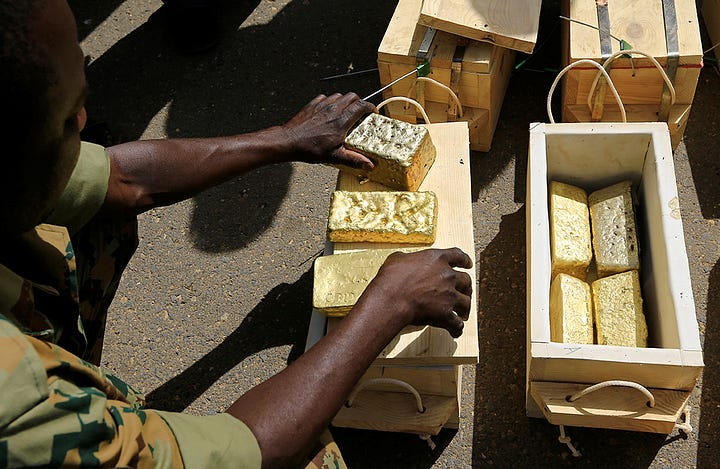

Financing Paramilitary Operations
Beyond Contracts: Many PMCs engage in parallel illegal revenue streams including:
Arms trafficking: Wagner smuggled SA-7 surface-to-air missiles and AK-47s into Sudan via CAR in 2021
Precious Stones: RSB Group extracted diamonds worth approximately $5.5 million from eastern CAR conflict zones in 2019-2020
Human trafficking: Wagner recruited prisoners from Russian penal colonies, offering commuted sentences for service
Money laundering: In 2020-2022, Wagner used front companies in Dubai, Hong Kong, and Cyprus to process approximately $300 million in mineral revenues. Financial records from the UAE show how Wagner laundered Sudanese gold through Dubai-based shell companies, exploiting lax regulations and even leveraging Bitcoin to launder funds for Ukraine.
Financial Infrastructure: Sophisticated financial networks support PMC operations:
Digital payments: Wagner utilized cryptocurrency (primarily Bitcoin and Monero) to move an estimated $28 million in 2021-2022
Shell companies: Prigozhin established 12 distinct corporate entities in tax havens between 2017-2022
Banking networks: Wirecard's financial infrastructure processed payments totaling approximately €350 million for Wagner and RSB Group operatives in Syria, Libya, and Sudan before its 2020 collapse
4. STATE BACKING
PMCs maintain close ties to their sponsoring states, functioning as extensions of state power while preserving plausible deniability:
Russian State Connections
Wagner-GRU Relationship: Wagner effectively functions as a paramilitary arm of the GRU, with detailed evidence including:
Direct command links: Wagner units received orders from GRU Colonel Andrey Averyanov, head of Unit 29155
Shared facilities: Wagner trained at the GRU's 10th Spetsnaz Brigade base in Molkino, Krasnodar
Equipment transfer: Satellite imagery from 2018-2023 documented Russian military Il-76 aircraft delivering equipment directly to Wagner in CAR, Mali, and Libya
Personnel overlap: Approximately 30% of Wagner commanders previously served in Russian military intelligence
Financial Infrastructure: Wagner operations were funded through specific Russian state-connected entities:
Evgeny Prigozhin received an estimated $2.5 billion in Russian state contracts between 2014-2022 through his Concord Group
Gazprombank provided direct financing for Wagner's African mineral acquisitions through its subsidiary GPB-Resources
Russian oil company Rosneft paid Wagner approximately $250 million for security services in Venezuela and Syria between 2017-2022
Formalization Post-Rebellion: After the June 2023 mutiny, the Kremlin mandated PMC registration under the "Expeditionary Corps" on July 14, 2023, requiring:
Direct reporting to Ministry of Defense's Main Intelligence Directorate
Standardized contract structure with 70% of revenues directed to state-controlled entities
Integration of communication systems with Russian military networks
Quarterly operational reviews by the Russian Security Council
Command Structure: Wagner's Africa strategy aligned with specific Russian foreign policy objectives outlined in the 2019 Russia-Africa Summit in Sochi:
Securing access to strategic minerals unavailable in Russia (cobalt, lithium, uranium)
Establishing military access points along key maritime routes
Creating alternative markets for Russian arms exports facing Western sanctions
Converting resource concessions into political leverage against Western interests
U.S. State Connections
Intelligence Community Integration: PMCs operate with specific governmental oversight:
CIA's Special Activities Center directly managed approximately 1,200 security contractors in Afghanistan and 800 in Iraq between 2018-2021
The 2006 Pakistan operation included 12 Blackwater "tactical action operatives" specifically selected by CIA's Counterterrorism Center targeting an al Qaeda training facility in North Waziristan
Triple Canopy operates under National Clandestine Service direction in at least 8 African countries with approximately 600 personnel
Contract Structure: U.S. PMCs maintain formalized government relationships:
Triple Canopy/Constellis held $4.3 billion in federal contracts between 2019-2023
The State Department's Worldwide Protective Services contract ($15 billion total) specifically requires intelligence sharing with U.S. agencies
The DoD's LOGCAP V contract includes provisions for "special activities" allowing contractors to perform quasi-military functions
Chinese State Connections
Belt and Road Security Framework: Chinese PMCs operate within a coordinated state strategy:
State Council Directive 2017-03 explicitly authorized Chinese security firms to protect overseas investments
The People's Armed Police provides training and personnel to at least 6 Chinese PMCs operating in Africa
China's 2023 "Administrative Measures for Overseas Security Companies" formalized PMC registration requirements under Ministry of State Security oversight
Corporate Governance Structure: Chinese PMCs maintain direct state connections:
FSG is 25% owned by CITIC Group, a state-owned investment company reporting to China's State Council
Huaxin Zhong An Security Services, operating in DRC copper mines, is 38% owned by provincial government investment vehicles
Ding Tai An Yuan Security Services includes former Ministry of State Security officials in senior positions, with 10+ operating in southern Iraq's oil regions
Operational Alignment: Chinese PMCs demonstrate clear coordination with state objectives:
FSG provides security specifically for companies listed in China's "Critical Mineral Security Strategy 2020-2025"
Security contractors are embedded with Chinese companies designated as "national champions" in strategic sectors
Chinese PMCs active in Africa receive intelligence support from Ministry of State Security stations at Chinese embassies
5. SECURITY THREATS
As discussed as far back as Sun Tzu and Machiavelli: mercenaries present significant security risks both to host nations and potentially to their sponsors and operate with unparalleled degrees of freedom.
Challenge to Sovereignty : PMCs directly challenge state authority:
Wagner established parallel governance structures in CAR, controlling 8 specific mining regions where government officials require Wagner permission to enter
Their personnel occupy 4 former French military bases in Mali, operating checkpoints that restrict government forces' movements
In Libya, Wagner embedded 147 military advisors within Haftar's command structure, directly influencing operational decisions
Russian PMCs deployed trainers to 9 African military academies between 2018-2023, reshaping military doctrine and creating dependencies
Proxy Conflict Acceleration: PMCs intensify existing tensions:
Wagner's deployment of 2,000+ contractors to eastern Ukraine in 2014-2022 directly escalated the Donbas conflict
In Syria, Russian PMCs engaged in direct combat with U.S. forces near Deir ez-Zor in February 2018,
Legally Unenforceable:
Wagner Group's operations in Mali resulted in precisely 456 confirmed civilian deaths between January 2020 and April 2022, including the March 2022 Moura massacre where 300+ civilians were executed In CAR, UN investigators documented 59 specific instances of torture, sexual violence, and summary executions by Wagner personnel between December 2020 and April 2021
Blackwater contractors killed 17 civilians and wounded 20 others at Nisour Square, Baghdad on September 16, 2007
Executive Outcomes operations in Angola resulted in documented civilian casualties, including 160+ deaths in Cafunfo, Lunda Norte province in 1994
Recruiting: PMCs recruit low-cost labor from impoverished regions (e.g., Nepali Gurkhas for U.S. bases in Iraq, Chadian mercenaries for Wagner in Libya
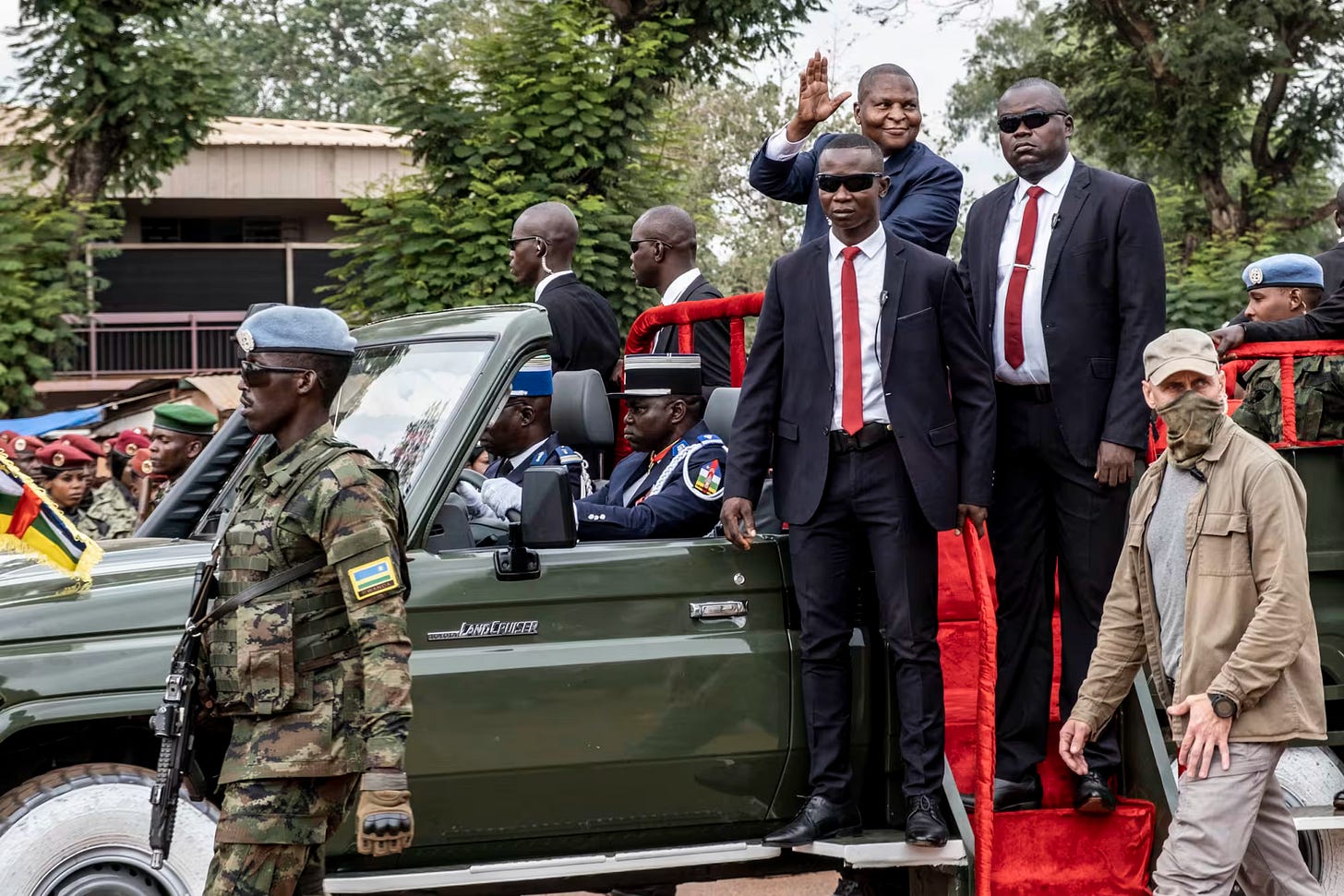
Regional Expansion
PMC’s serve the purpose of stabilising markets, ensure contractual enforceability, and enforce monopolies, thereby securing access to natural resources for multinational corporations from local resistance. Russia and China lead PMC expansion in Africa, competing for resource access. Wagner operates in 19 African countries, while Chinese PMCs secure BRI infrastructure.
Niger: Post-2023 coup, the ruling junta has aligned closely with Russia, forming the Alliance of Sahel States alongside Mali and Burkina Faso. This coalition has expelled French forces and is receiving Russian military support, including training and equipment for a joint force aimed at combating jihadist insurgencies
Burkina Faso: The junta has expelled French troops and welcomed Russian assistance. Reports indicate the deployment of Africa Corps personnel to protect the regime and support counterterrorism efforts .
Nigeria – Shell, Mercenaries, and the Niger Delta; Shell allegedly collaborated with the Nigerian military (1990s) and later with PMCs to suppress resistance from the Ogoni people protesting oil exploitation. Ken Saro-Wiwa’s execution followed. The Internet Research Agency (IRA), linked to Wagner’s Yevgeny Prigozhin, deployed Ghanaian and Nigerian troll farms to spread anti-Western narratives in west Africa.
Actors: Shell, UK/US intelligence, PMCs (e.g., Control Risks Group).
Congo (DRC) – Mining, Wagner, and Global Competition Ongoing scramble for cobalt, lithium, diamonds. Wagner used to protect Russian-aligned assets; Western PMCs operate around Chinese and Western mines.
Actors: Involves Russian Wagner Group, Chinese and Western mining firms, Congolese elites.
Libya (Post-Gaddafi) – French/Emirati Support, PMC Operations Competing factions supported by foreign powers due to control over protecting oil pipelines, terminals, convoys, and personnel. PMCs supplied air support, sabotage, security and sniper operations.
Actors: UAE-funded PMCs, French DGSE, U.S. (esp. through CIA, JSOC, and Blackwater/Xe/Academi), Wagner Group.
Mozambique – Islamist insurgency threatened LNG projects in Cabo Delgado. DAG contracted for air support; Wagner withdrew after failures.
Actors: French firm TotalEnergies, DAG (PMC), Wagner (briefly), LNG projects
Central African Republic (CAR) and Democratic Republic of Congo
Wagner guards cobalt, diamond and gold mines and trains presidential guard in exchange for concessions.
North Kivu (2023): UN reports from April 2023 linked Prince to advanced plans for deploying 2,500 Latin American mercenaries (primarily Colombian and Peruvian former military personnel) to protect 12 specific mining operations in this mineral-rich region, focusing on coltan and gold deposits near Walikale and Rubaya.
FSG (2023-2025): Signed specific agreement with Kinshasa government in December 2023 to secure and tax artisanal and industrial mining operations in Kolwezi and Lubumbashi regions. The contract gives Prince's organization authority over cobalt supply chains that account for 70% of global production, with particular focus on 28 specific industrial mining sites and over 100 artisanal mining zones producing lithium, cobalt, and copper
East Africa (Ethiopia, Somalia) Foreign intelligence involvement includes support for military operations, counterterrorism efforts, and securing maritime routes.
South Sudan Triple Canopy / Constellis Provided security for Chevron and other U.S.-linked oil infrastructure. Worked closely with government forces during civil conflicts.
South Africa South Africa Boasts numerous ex-apartheid-era Special Forces became PMC leaders. Involved in diamond fields in Angola, Sierra Leone, and Equatorial Guinea.
Conclusion
Interests of multinational corporations increasingly shape foreign policy and military strategy, particularly in securing access to resources and markets; Shipping firms, manufacturers, and energy companies lobby governments to secure maritime chokepoints and protect supply chains, often leading to military deployments in contested regions. As such, PMCs have become integral to modern geopolitical strategies, particularly in resource-rich African regions. PMCs will continue to serve as deniable instruments of state power, with Russia, China, and Turkey expanding their African footprint while the U.S. maintains selective engagement. Resource protection will remain the primary mission, with PMCs increasingly involved in securing critical minerals essential for defense and green technologies. Security threats will persist as PMCs destabilize regions, erode sovereignty, and occasionally act against sponsor interests when profitable.
Grayzone: The United Nations Mercenary Convention (1989), which has only 35 state ratifications, the Montreux Document (2008), Libreville Convention Against Mercenarism (1977) and even and ISO 18788 standards which aim to regulate the use of mercenaries, lack any effective enforcement mechanisms and will not serve as a deterrent given the extent of national security and financial interests. Especially given how PMCs exploit lack of extraterritorial jurisdiction, using shell companies and offshore registration to avoid legal consequences.
Legalism: The utility of PMC’s is ensuring clean enforceable contracts in contested or lawless regions. States like DRC and CAR are weaponizing PMCs to reassert control over “leaky” resource sectors. Provides certainty through overwhelming use of force.
Global: While we have focused here on Africa, this is a global phenomenon with Russian PMCs guarding Maduro's regime in Venezuela, while American Security (Brazil) and PGI (Colombia) protect mining and oil infrastructure amid rising cartel violence. Additionally, PMCs like Northguard (Norway) and Patriot (Russia) increasingly secure shipping lanes and energy projects in contested Arctic regions. For instance, Erik Prince, founder of Blackwater, proposed a $10 billion plan to create a private military company in Ukraine, aiming to leverage the nation's military-industrial facilities and combat veterans.
End of Brief.
[For more information on Section 14 please click here.]




